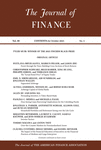-
作者:Bolton, Patrick; Freixas, Xavier; Shapiro, Joel
作者单位:Columbia University; Pompeu Fabra University; University of Oxford
摘要:The collapse of AAA-rated structured finance products in 2007 to 2008 has brought renewed attention to conflicts of interest in credit rating agencies (CRAs). We model competition among CRAs with three sources of conflicts: (1) CRAs conflict of understating risk to attract business, (2) issuers ability to purchase only the most favorable ratings, and (3) the trusting nature of some investor clienteles. These conflicts create two distortions. First, competition can reduce efficiency, as it faci...
-
作者:Bongaerts, Dion; Cremers, K. J. Martijn; Goetzmann, William N.
作者单位:Erasmus University Rotterdam - Excl Erasmus MC; Erasmus University Rotterdam; Yale University
摘要:This paper explores the economic role credit rating agencies play in the corporate bond market. We consider three existing theories about multiple ratings: information production, rating shopping, and regulatory certification. Using differences in rating composition, default prediction, and credit spread changes, our evidence only supports regulatory certification. Marginal, additional credit ratings are more likely to occur because of, and seem to matter primarily for, regulatory purposes. Th...
-
作者:Golubov, Andrey; Petmezas, Dimitris; Travlos, Nickolaos G.
作者单位:City St Georges, University of London; University of Surrey
摘要:We provide new evidence on the role of financial advisors in M&As. Contrary to prior studies, top-tier advisors deliver higher bidder returns than their non-top-tier counterparts but in public acquisitions only, where the advisor reputational exposure and required skills set are relatively larger. This translates into a $65.83 million shareholder gain for an average bidder. The improvement comes from top-tier advisors ability to identify more synergistic combinations and to get a larger share ...
-
作者:McLean, R. David; Zhang, Tianyu; Zhao, Mengxin
作者单位:Chinese University of Hong Kong
摘要:Investor protection is associated with greater investment sensitivity to q and lower investment sensitivity to cash flow. Finance plays a role in causing these effects; in countries with strong investor protection, external finance increases more strongly with q, and declines more strongly with cash flow. We further find that q and cash flow sensitivities are associated with ex post investment efficiency; investment predicts growth and profits more strongly in countries with greater q sensitiv...
-
作者:Fernando, Chitru S.; May, Anthony D.; Megginson, William L.
作者单位:University of Oklahoma System; University of Oklahoma - Norman; Wichita State University
摘要:We examine the long-standing question of whether firms derive value from investment bank relationships by studying how the Lehman collapse affected industrial firms that received underwriting, advisory, analyst, and market-making services from Lehman. Equity underwriting clients experienced an abnormal return of around 5%, on average, in the 7 days surrounding Lehman's bankruptcy, amounting to $23 billion in aggregate risk-adjusted losses. Losses were especially severe for companies that had s...
-
作者:Fracassi, Cesare; Tate, Geoffrey
作者单位:University of Texas System; University of Texas Austin; University of California System; University of California Los Angeles
摘要:We use panel data on S&P 1500 companies to identify external network connections between directors and CEOs. We find that firms with more powerful CEOs are more likely to appoint directors with ties to the CEO. Using changes in board composition due to director death and retirement for identification, we find that CEO-director ties reduce firm value, particularly in the absence of other governance mechanisms to substitute for board oversight. Moreover, firms with more CEO-director ties engage ...
-
作者:Julio, Brandon; Yook, Youngsuk
作者单位:University of London; London Business School; Sungkyunkwan University (SKKU)
摘要:We document cycles in corporate investment corresponding with the timing of national elections around the world. During election years, firms reduce investment expenditures by an average of 4.8% relative to nonelection years, controlling for growth opportunities and economic conditions. The magnitude of the investment cycles varies with different country and election characteristics. We investigate several potential explanations and find evidence supporting the hypothesis that political uncert...


